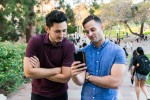Two UCLA alumni are trying to connect voters with local politics and news through a social media app.
Matt Pell and Kai Bryant, who both graduated from UCLA in 2015 with history degrees, are in the final stages of developing The Burg, an app meant to encourage civic participation, inform individuals about local politics and ensure elected officials are accurately representing their localities. The app’s name came from the German word “Buerger,” which refers to community, Pell said.
Private users are currently testing the app, which will be available to the public in November, he added.
Users will be able to discuss local news and politics with their communities, called “burgs,” by posting content and voting on which stories and links they prefer. Posts with the most votes are placed at the top of the app’s feed.
“Think of the format as Reddit meets city hall, with the same up-vote and down-vote structure,” Pell said.
He said the voting system allows people to moderate what content they want on their feeds.
“We are big believers in being as hands off as possible when it comes to moderating speech,” Pell said.
However, Pell said dangerous or illegal posts are not allowed and will be taken down.
“We allow people to report posts and we’d take them down,” Pell said. “Our algorithm is fairly distant from most social media and is far more similar to a system like Reddit’s, which we feel will provide the best foundation for civic discourse.”
Pell said most users are divided up into burgs by cities; the exception is Los Angeles, which, due to its size, is separated into city council districts. The most popular posts and news from each burg are funneled into a trending section. Pell added users must use their given names when interacting on the app.
“People hiding behind anonymity tend to be more ruthless and less civil,” he said. “Nonvoters can be in The Burg as well, but elected representatives value knowing when they are on The Burg, they are actually speaking with their constituents.”
Pell said they created the app because they noticed that few people participated in local elections and wanted to better engage voters. Voter turnout in the 2016 Los Angeles County election, for example, was just 11 percent.
Pell and Bryant received some funding for the app after attending the United StatesConference of Mayors‘ 85th Annual Meeting, a meeting of major city mayors, in June.
Bryant said he thinks it is difficult to learn about local news without social media and said he hopes the app will lower barriers to local engagement. Pell said he thinks individuals want to participate in local politics but do not always know how to get involved.
“The problem is accessibility, not apathy,” Pell said.
Michael Chwe, a professor in the department of political science, said he thinks engagement in local politics is low because local media does not have as strong of a presence in people’s lives, causing individuals to feel less connected to their local communities.
He added people will become more active in local politics if they are informed of and feel invested in issues in their communities.
Victoria Vasquez, a second-year political science student, said she thinks the app will make local news more accessible for social media users.
“On Facebook and other social media sites, we’re more focused on what people are doing with their lives,” she said. “This app gives us the ability to pay more attention to what is happening with local news rather than seeing what our friend’s cat ate for breakfast.”
Pell said they will launch the app in Los Angeles County over the next few weeks, and then launch it throughout California.
“We hope The Burg inspires a community renaissance and becomes the online space for the community,” he said.
